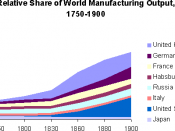One glance at a modern world map shows Europe as significantly smaller than its neighbouring landmasses. Yet at one time, most of the world was dominated by European flags. This era is known as the ÃÂAge of ImperialismÃÂ and was developed in major European countries in the 19th and 20th centuries. Powerful nations, such as Great Britain, France, and Germany, sought to expand their empires through colonizing mainly parts of Asia and Africa. This age led to great industrial growth; yet there were many unanticipated results, such as the Balkan Wars, Moroccan Crises, and ultimately, the initiation of World War I, that give rise to questions about the reasons and morality behind employing a strategy of imperialism. The nations of Europe adopted the policy of imperialism in order to meet the increasing demands of their economies. Nationalist and racist theories legitimized the social domination of certain peoples, while age-old rivalries between nations escalated the want for political dominance.
The growing need for markets and raw materials was the driving force for colonization, particularly for Great Britain, France, and Germany. Rapid population growth and the economic crises brought on by the Long Depression (1873 ÃÂ 1896) made it necessary for all nations to acquire large amounts of resources for their economical sustenance. Great Britain, the initiator of imperial policy, in particular needed to enlist the help of other colonies in order to keep her economy stabilized because she was an island nation. Although colonization in the Americas provided least resistance, it was the African and Asian colonies that were most beneficial because of their potential for trade. For example, the British colony of Canada was larger than India, yet India had a greater population and wealth of resources; thus the reason for heavy British investment in India. Colonization was...


